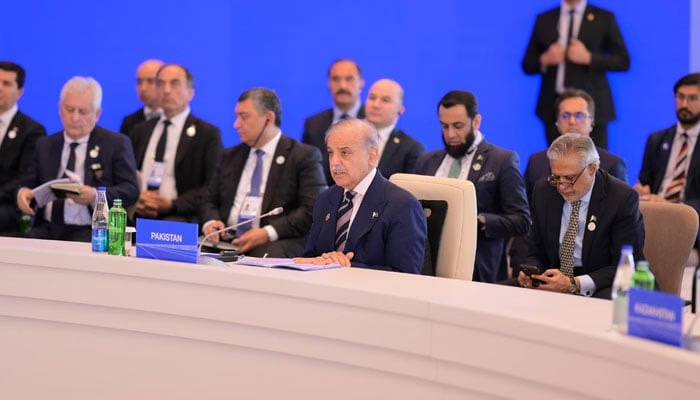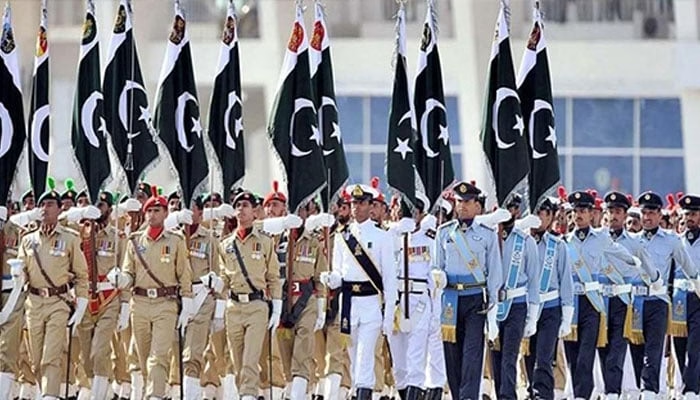Prime Minister Shehbaz Sharif on Friday emphasized the urgent need for stronger regional cooperation among the member states of the Economic Cooperation Organisation (ECO) in the face of intensifying global and regional challenges, especially climate change and geopolitical instability.
Speaking at the 17th ECO Summit held in Khankendi, Azerbaijan, PM Shehbaz highlighted the environmental degradation being experienced across the region. He pointed out that countries within the ECO bloc are facing a range of climate-induced issues such as melting glaciers, desertification, extreme weather events, and declining agricultural productivity.
“Deeper collaboration among ECO members is essential to build resilience and ensure sustainable development amid increasing environmental and political uncertainty,” he said. He reminded the summit participants that Pakistan is among the top 10 countries most vulnerable to climate change. Recalling the devastating floods of 2022 that displaced over 33 million people in Pakistan, the prime minister stressed the need for urgent climate action.
In an effort to promote sustainable environmental practices, PM Shehbaz proposed the creation of low-emission corridors and advocated for the establishment of a regional carbon market to facilitate climate finance cooperation among ECO nations.
During his address, PM Shehbaz also expressed gratitude to the ECO member states for designating Lahore as the ECO Tourism Capital for 2027. He invited delegates to visit Pakistan and experience its diverse cultural heritage. “Lahore, the cultural heart of Pakistan, will enthrall all who visit. We extend a warm invitation to all member states,” he said.
Strong Condemnation of Israeli and Indian Aggression
Shifting focus to regional security, the prime minister strongly condemned the recent Israeli missile strike on Iran, describing it as “unlawful, unjustified, and uncalled for.” He offered heartfelt condolences to the people of Iran and wished a speedy recovery for the injured. “Pakistan strongly condemns this act of Israeli aggression… We pray for the recovery of our injured brothers and sisters in Iran,” he added.
He also criticized the “unprovoked and reckless” Indian hostility toward Pakistan following the Pahalgam incident, calling it another attempt by India to destabilize regional peace. PM Shehbaz expressed appreciation for the support and solidarity shown by ECO member countries in the wake of Indian aggression earlier this year.
The prime minister went on to condemn Israeli actions in Gaza, labeling them as acts of barbarism. “Pakistan stands firmly against those who perpetrate barbaric acts against innocent people—whether in Gaza, Indian Illegally Occupied Jammu and Kashmir (IIOJK), or Iran,” he said.
India’s Violation of Water Treaties
Another key issue raised by PM Shehbaz was the weaponization of water resources by India. He criticized New Delhi for violating the Indus Waters Treaty (IWT) and referred to the recent verdict by the Permanent Court of Arbitration. “This violation is completely unacceptable. The Indus waters are a lifeline for Pakistan’s 240 million people. India’s actions amount to aggression,” he asserted.
Diplomatic Engagements on the Sidelines
On the sidelines of the summit, Prime Minister Shehbaz held several high-profile meetings with regional leaders. In his meeting with Turkish President Recep Tayyip Erdogan, both leaders conducted a comprehensive review of bilateral ties. They discussed key regional developments and reaffirmed their resolve to deepen cooperation across all major sectors.
PM Shehbaz also met with Iran’s newly elected President Masoud Pezeshkian. The two leaders reviewed ongoing bilateral cooperation and expressed satisfaction with the progress made since their last meeting. They committed to continuing their joint efforts for peace and stability in the region through dialogue and diplomacy. The evolving regional situation, especially following Israel’s strike on Iran, was also discussed during the meeting.
In another key engagement, the prime minister held talks with Azerbaijani President Ilham Aliyev. Both leaders agreed to enhance cooperation in multiple sectors including trade, investment, energy, connectivity, and cultural exchanges. The two leaders expressed satisfaction over the progress made in terms of Azerbaijan’s investment prospects in Pakistan and reiterated their resolve to strengthen economic ties.
Prime Minister Shehbaz’s participation in the ECO Summit and his diplomatic engagements underline Pakistan’s commitment to regional integration, peace, and sustainable development. His call for united action against climate change, unlawful aggression, and economic instability reflects the broader challenges facing the region—and the urgency with which they must be addressed.



